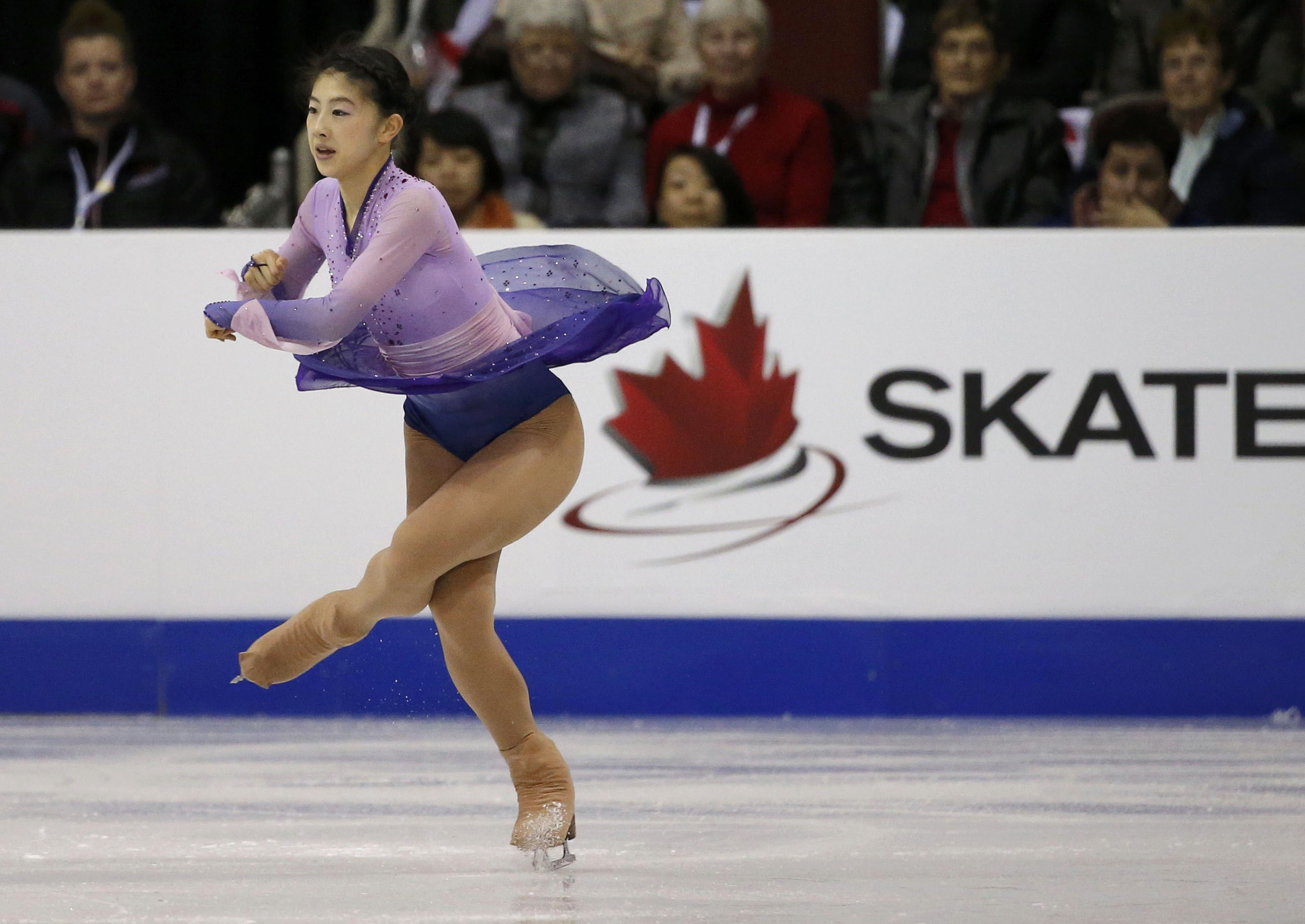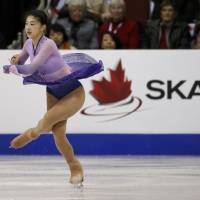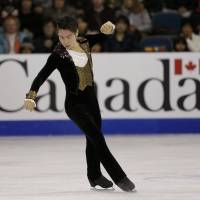It was another successful event for Team Japan at Skate Canada in Lethbridge, Alberta, last weekend.
The Hinomaru took home three of the six singles medals on offer with a pair of surprising performances from senior debutante Yuka Nagai and veteran Daisuke Murakami.
Nagai, a 16-year-old from Tokyo, finished third behind American veteran Ashley Wagner and Russian world champion Elizaveta Tuktamysheva, while in the men's field Olympic champion Yuzuru Hanyu and Murakami came in second and third, respectively.
Finishing on the podium next to Wagner and Tuktamysheva was quite an accomplishment for Nagai. She was second following the short program after Tuktamysheva finished a shocking seventh.
While the Russian's rally to take second came as no surprise, Nagai holding on to get the bronze was.
Nagai beat out several Olympians for third place, including compatriot Kanako Murakami (who was fourth) and American Polina Edmunds (who placed sixth). Skating to "Madame Butterfly" in the short program, Nagai looked nice in a purple outfit and exhibited great poise and interpretation. Her bright smile enhanced her performance even more.
Ice Time remembers seeing Nagai at last year's Junior Grand Prix in Nagoya (where she came in second) and believes she has really blossomed in the past year. In September of 2014 she seemed like a young girl, but now she is a mature and confident woman.
She began her short program with a sublime triple lutz/triple toe loop combination and received good technical marks from the judges. Nagai struggled in her free skate (coming in seventh), but she fought through and made an impression.
"Her presentation was super throughout," proclaimed one of the Eurosport2 announcers analyzing the competition.
"I still can't believe that I'm in third place," Nagai was quoted as saying by isu.org at the press conference after the free skate. "My program was not enough today, but I enjoyed my skating."
Nagai is part of the new generation of skaters, along with Satoko Miyahara, Rika Hongo and juniors Yuna Shiraiwa, Marin Honda and Wakaba Higuchi.
Nagai is very polished for her age, and there is no doubt that if she goes overseas to train with a coach like Brian Orser or Nikolai Morozov in the future, the sky is the limit on her potential.
Daisuke Murakami was the shock leader after the short program ahead of three-time world champion Patrick Chan and teammate Hanyu, and his third-place showing proved that last season's victory at the NHK Trophy was no fluke.
Ice Time remembers a conversation with Morozov years ago when he spoke about Murakami's potential. Now he is fulfilling it. The 24-year-old Kanagawa native is a late bloomer in skating terms.
Murakami and his family moved to the U.S. in 2000 after winning the green card lottery, and he skated for the Stars and Stripes through the 2006-07 season, when he began competing for Japan.
Though he has been on the scene for many years, Murakami has always found himself in the shadow of the likes of Hanyu, Daisuke Takahashi and Takahiko Kozuka.
Though he was overtaken by both Chan and Hanyu in the free skate, Murakami hit two quads and six triple jumps to "Anniversary" and picked up his second senior GP medal. His grit impressed observers.
"A display of amazing core strength throughout that program," gushed one of the Eurosport2 announcers about Murakami after his free skate.
Murakami's task wasn't made any easier by the fact he had to skate last, after Chan and Hanyu had already posted big numbers on the board.
"This was my first time sitting in first in a Grand Prix event," stated Murakami. "Skating after two world and Olympic medalists was definitely a different situation for myself and I am glad I kept my composure."
Hanyu bounced back from a calamitous short program (which saw him in sixth place) with a scintillating free skate to "Seimei" in which he landed three quads. He did fall on a triple lutz, however, but his legion of fans should not be discouraged.
If Hanyu's short program had not been so bad (his total of 73.25 was more than 28 points off his record-setting tally of 101.45 at the Sochi Olympics), he would have beaten Chan handily. He finished just 11.6 points behind Chan (271.14 to 259.54) in the final standings.
Hanyu's finest effort may have come at the press conference after the free skate on Saturday, where he showed off his highly improved English skills. He had to revert to Japanese when his description became too technical, but showed his fortitude extends beyond the ice.
"My score wasn't good in the short program," Hanyu noted in English. "I popped the quad toe and the lutz combination was not good. So I didn't get the points in the short program, but I believed that I can do it (today). So I was able to do all my quads in the free skating."
Hanyu said he had mixed emotions on the first day at Skate Canada.
"In the short program I was very confident and felt comfortable," he commented in Japanese. "Today I also felt comfortable but it was a little bit different. On the day of the short I was calm but also excited. I know that sounds like a contradiction, but that is the way I felt."
Hanyu approached the free skate with a different strategy.
"Today it was different because I felt more about skating my best and just showing what I have been doing at practice, rather than trying to skate clean," he said. "So the mental setup was a little different."
This week: Three-time world champion Mao Asada will make her much-anticipated return to the ice at the Cup of China in Beijing. Mao will be joined there by Hongo.
With Kozuka having pulled out last month with an ankle injury, Japan will have no representative in the field for the men's competition.





















With your current subscription plan you can comment on stories. However, before writing your first comment, please create a display name in the Profile section of your subscriber account page.